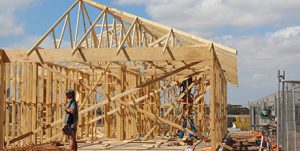Building sites have been deemed essential activities by the Federal Government and spared from the tight restrictions placed on restaurants, pubs, clubs, cinemas and other non-essential businesses. Source: Timberbiz
However, while business continues as usual, some in the industry are warning that a forced shutdown of building sites would have a “devastating” impact on the industry and that some supply lines are almost certainly going to be disrupted.
The Master Builders Association and the CFMEU National Construction Division have joined forces to ensure the construction industry remains a backbone of the Australian economy and able to sustain the millions of people dependent upon it throughout the coronavirus crisis.
The principle union and employer group in the industry are working cooperatively to keep people safe at work while calling on governments and the banks to support the industry and all its people through the uncertainty of the months ahead.
Master Builders SA chief executive Ian Markos said a forced shutdown of building sites would have a “devastating” impact on the industry.
“Construction sites are often very large and spaced out, and for most of the build they are open air.
“The industry has capacity through work health and safety mechanisms to enact social distancing policies in workplaces along with heightened safety measures to protect workers and reduce the risk of infection.”
The construction industry is a lynchpin of the Australian economy. It accounts for around 10% of our GDP and employs 1.2 million people which is 9.1% of the entire Australian workforce. The industry provides more full-time jobs than any other sector of the economy and is made up of 395,000 businesses – 388,800 of which are SMEs.
If coronavirus forces the shutdown of the industry it will have a devastating impact on the economy generally and upon the lives of construction workers and business operators and all their families.
The health and wellbeing of everyone in the building and construction industry is our priority. This also means ensuring that the building and construction industry is kept as strong as possible through these difficult times.
The industry has capacity through work health and safety mechanisms to enact social distancing policies in workplaces along with heightened safety measures to protect workers and reduce the risk of infection. Social isolation and hygiene measures as discussed with health authorities are already in place on many sites and must be immediately put in place on all sites.
While most building sites continue to operate, one supplier, who declined to be named, has been reported as saying it was “inevitable” that a shutdown would be enforced at some point.
“For now they’re saying building and construction is an essential industry, but if that changes there are concerns that funding could be pulled from developers and people could lose their jobs,” the supplier told The Advertiser in Adelaide.
“We understand they’re saying the industry is an essential industry because of the economic impact a shutdown would have.
“The feeling we’ve got is that it’s inevitable that at some stage we’ll need to have a two-week shutdown to assist in flattening the curve – any more than that and companies would struggle and potentially fall over without some sort of government support.”
The MBA and the CFMEU wants a comprehensive package of stimulus measures to be delivered to underpin building activity, the industry’s massive contribution to the economy and protect the livelihoods of construction workers, builders and tradies around the country.
If worksites are shut down and workers forced off the job due to the virus, they want an appropriate and liveable safety net in place.
The peak body for Australia’s off-site construction industry, prefabAUS, said that while it welcomed the $17.6 billion package for small businesses and households and also the move by the Reserve Bank to provide funds for banks and non-bank lenders to provide support to small businesses in the midst of the COVID-19 challenge the livelihoods of the 1 in 10 Australians employed in the industry remained at stake as is the viability of the nearly 390,000 small businesses that make up the industry and the thousands of enterprises that supply them.








